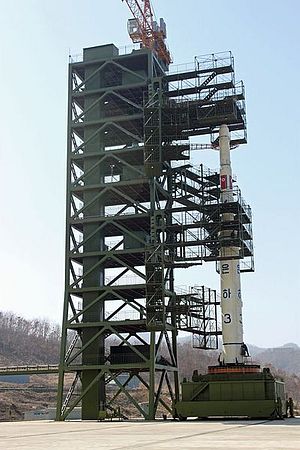On October 10, North Korea will celebrate the 70th anniversary of the founding of the Workers’ Party of Korea. Observers are wondering whether Pyongyang will decide to mark the occasion with a literal bang, by launching a satellite via a long-range missile during the celebrations.
North Korea maintains that such launches are part of a peaceful space program; the United States and South Korea say that the satellite launches are simply excuses to test ballistic missiles. “There are multiple UN Security Council resolutions that require North Korea to suspend all activities related to their ballistic missile program … So any satellite launch using ballistic missile technology would be a clear violation of those resolutions,” U.S. State Department spokesperson John Kirby told reporters on Monday.
A release from North Korea’s KCNA added fuel to the speculation that a launch is in the works. KCNA interviewed the director of North Korea’s National Aerospace Development Administration, who spoke of “shining achievements” in the “field of outer space development.” The director, in particular, said that “NADA is pushing forward at a final phase the development of a new earth observation satellite for weather forecast.”
“The world will clearly see a series of satellites of Songun [military-first] Korea soaring into the sky at the times and locations determined by the WPK Central Committee,” KCNA concluded.
South Korean Foreign Ministry spokesperson Noh Kwang-il told reporters that ballistic missile launches from North Korea “are a grave provocative act and military threat.” In the event of a launch, Noh said, Seoul would “work closely with relevant nations, including [UN] Security Council members, to enable a swift and effective response by the Security Council.” However, South Korea’s Foreign and Defense Ministries have said they have yet to detect any unusual activity at the launch site.
38 North, which provides in-depth analysis of North Korea affairs, agreed that there are no definite signs that North Korea is preparing for a launch in the immediate future. “[T]he general low level of activity throughout the facility suggests a launch is not going to occur over the next few weeks,” analysts Jack Liu and Joseph Bermudez wrote on September 3. However, they noted that if a launch is planned for October 10, it would still be too early for the launch vehicle itself to be moved to the Sohae Satellite Launching Station.
China’s Foreign Ministry also addressed the speculation that North Korea is preparing a launch. “The DPRK is entitled to peacefully use the outer space as a sovereign state, yet this right is restricted by the UN Security Council’s resolution,” spokeperson Hong Lei said on Tuesday. The “relevant resolution should be earnestly implemented,” he added.
“China hopes that relevant party would show prudence, and avoid taking any action that may cause tension to the Peninsula and the region,” Hong said.
Coincidentally, one of China’s main foreign policy think tanks, the China Institute of International Studies, is preparing to hold an international seminar commemorating the 10th anniversary of the 2005 Joint Statement of the Six Party Talks, when the negotiating parties (China, Japan, North Korea, Russia, South Korea, and the United States) agreed on steps toward denuclearizing the Korean peninsula. Hong said that China hopes the seminar will “enable all parties to review the significance of the Joint Statement,” return to the “targets and principles established by the Joint Statement,” and “restart the Six Party Talks at an early date.”
China has consistently pushed for a return to the talks, which collapsed (after numerous stops-and-starts) in 2009 after a North Korean satellite launch and resulting UN condemnation. Despite China’s often stated hope to restart the talks (which were a Chinese brainchild to begin with), there’s been little enthusiasm from other participants.
When asked if restarting the Six Party Talks was feasible, given the August mini-crisis on the Korean Peninsula and current rumors of a DPRK satellite launch, Hong Lei remained upbeat. “It meets the common interests of all parties to address the Korean nuclear issue through dialogue, realize denuclearization of the Korean Peninsula, and maintain peace and stability of the Peninsula,” he said. “China is ready to work together with all parties and push for the early resumption of the Six-Party Talks.”
It’s going to be especially difficult to bring all the parties back to the table given the current atmosphere. Speculation of an upcoming launch in North Korea has overshadowed other positive signs, including the recent announcement that both sides had agreed to conduct another round of family reunions in late October.
Beyond the possibility of a satellite launch itself, observers are concerned about the precedent of such launches presaging nuclear tests. North Korea launched a satellite in December 2012, then announced it had conducted an underground nuclear test in February 2013.
KCNA recently cited the director of the Atomic Energy Institute of North Korea as confirming that the country’s nuclear reactor and uranium enrichment plant in Yongbyon “started normal operation” in 2013. 38 North has reported that satellite imagery of Yongbyon suggests that significant work is underway, possibly to modernize the facility or (more worryingly) to prepare to produce new plutonium.

































